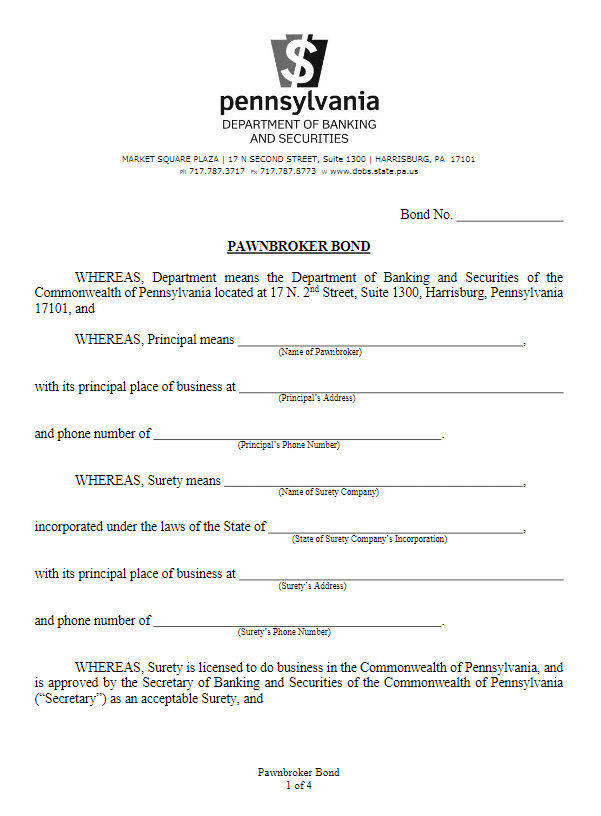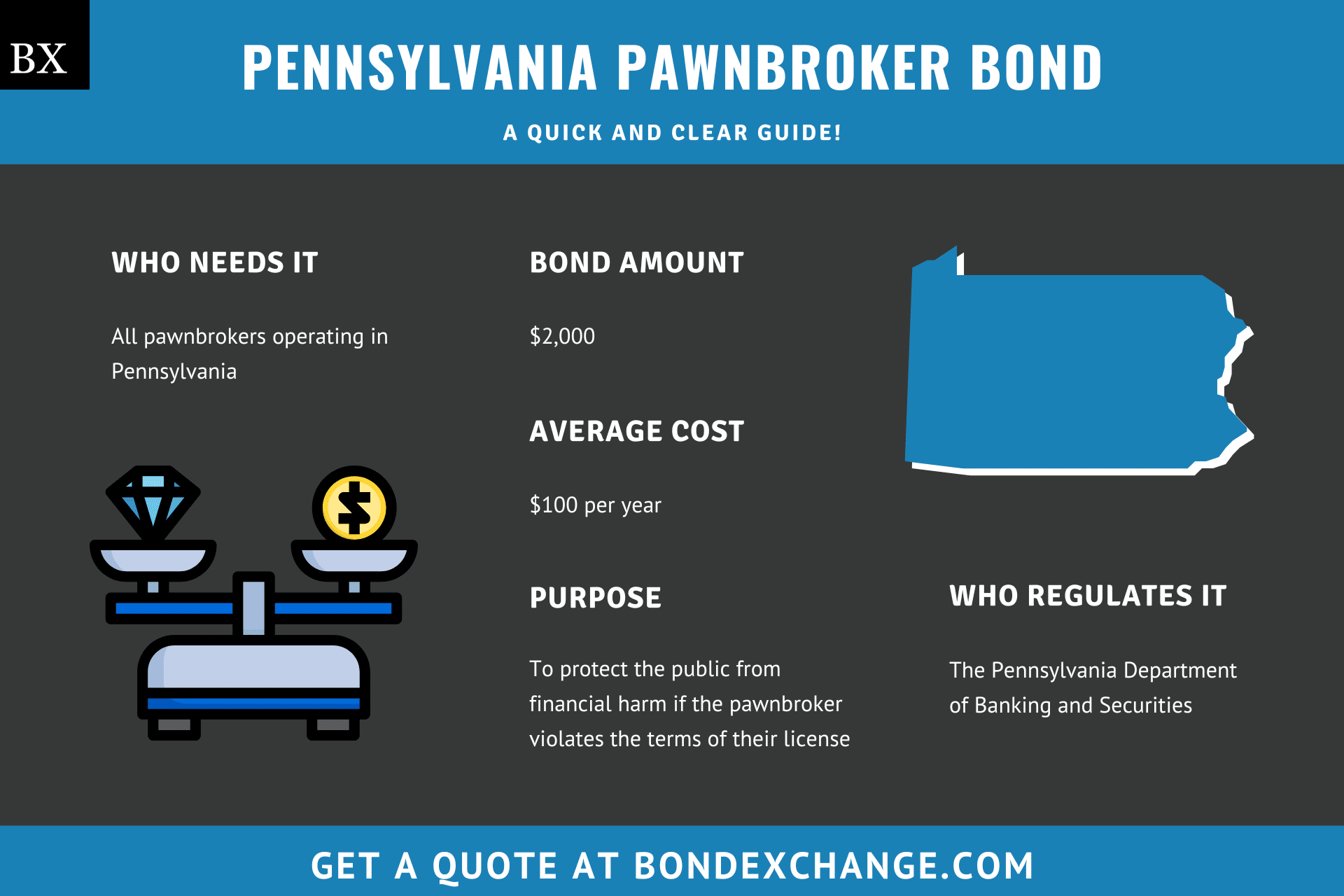Pennsylvania Pawnbroker Bond: A Comprehensive Guide
This guide provides information for insurance agents to help their customers obtain a Pennsylvania Pawnbroker bond.
At a Glance:
- Average Cost: $100 per year or $10 per month
- Bond Amount: $2,000
- Who Needs it: All pawnbrokers operating in Pennsylvania
- Purpose: To protect the public from financial harm if the pawnbroker violates the terms of their license
- Who Regulates Pawnbrokers in Pennsylvania: The Pennsylvania Department of Banking and Securities

Background
Pennsylvania Statute 281-3 requires all pawnbrokers operating in the state to obtain a license with the Department of Banking and Securities before conducting business. The Pennsylvania legislature enacted the licensing requirement to ensure that pawnbrokers engage in ethical business practices. To provide financial security for the enforcement of the licensing law, pawnbrokers must purchase and maintain a $2,000 surety bond to be eligible for licensure.
What is the Purpose of the Pennsylvania Pawnbroker Bond?
Pennsylvania requires pawnbrokers to purchase a surety bond as part of the application process to obtain a pawnbroker license. The bond ensures that the public will be protected from financial harm if the broker fails to comply with the regulations set forth in Pennsylvania Statute 281-5. Specifically, the bond protects the public in the event the broker engages in acts of fraud or breaches consumer contracts. In short, the bond is a type of insurance that protects the public if the pawnbroker violates the terms of their license.
How Can an Insurance Agent Obtain a Pennsylvania Pawnbroker Surety Bond?
BondExchange makes obtaining a Pennsylvania Pawnbroker bond easy. Simply log in to your account and use our keyword search to find the “Pawnbroker” bond in our database. Don’t have a login? Gain access now and let us help you satisfy your customers’ needs. Our friendly underwriting staff is available by phone at (800) 438-1162, email, or chat from 7:30 AM to 7:00 PM EST to assist you.
At BondExchange, our 40 years of experience, leading technology, and access to markets ensures that we have the knowledge and resources to provide your clients with fast and friendly service whether obtaining quotes or issuing bonds.
Not an agent? Then let us pair you with one!
Click the above image to find a BX Agent near you
Is a Credit Check Required for the Pennsylvania Pawnbroker Bond?
No, a credit check is not required for the Pennsylvania Pawnbroker bond. Because the bond is considered relatively low risk, the same low rate is offered to all pawnbrokers operating in the state, regardless of their credit history.
How Much Does the Pennsylvania Pawnbroker Bond Cost?
The Pennsylvania Pawnbroker bond costs just $100 per year or $10 per month.
Who is Required to Purchase the Pennsylvania Pawnbroker Bond?
Pennsylvania requires pawnbrokers to purchase a surety bond as a prerequisite for obtaining a license. To paraphrase Pennsylvania Statute 281-2, a pawnbroker is a person who issues loans to individuals that leave their property, as collateral, for the broker to sell on condition that the customer may repurchase the property within a fixed period of time.
Exemptions to this definition include:
- Licensed banking institutions, building and loan associations, or credit unions
- Storage warehousemen
BondExchange now offers monthly pay-as-you-go subscriptions for surety bonds. Your customers are able to purchase their bonds on a monthly basis and cancel them anytime. Learn more here.
How Do Pawnbrokers Apply for a License in Pennsylvania?
Pawnbrokers in Pennsylvania must navigate several steps to secure a pawnbroker license and must obtain a separate license for each pawnshop location they operate. Below are the general guidelines, but applicants should refer to the Nationwide Mortgage Licensing System’s (NMLS) application checklist for details on the process.
License Period – All Pennsylvania Pawnbroker Licenses expire on October 1 of each year and must be renewed before the expiration date
Step 1 – Meet the Capital Requirements
To be eligible for a license, pawnbrokers must have a minimum of $10,000 in start-up capital per pawnshop location. The minimum capital must be maintained as permanent capital throughout the entire license period, and pawnbrokers will be required to submit a financial statement with their application as proof.
Step 2 – Purchase a Surety Bond
Pawnbrokers must purchase and maintain a $2,000 surety bond.
Step 3 – Submit an Application
All Pennsylvania Pawnbroker License applications should be submitted online through the NMLS online here. Pawnbrokers must complete the application in its entirety and submit the following items:
-
- $500 licensing fee
- $36.25 criminal background check fee
- Surety bond
- PA State Criminal Background History
- FBI Criminal Background Check
- Tax waiver and certification form
- Company business plan
- Company formation documents
- Proof of errors and omissions insurance policy
- Financial statements including a balance sheet, income statement, and statement of cash flows
Pawnbrokers must also authorize NMLS to obtain a credit report and pay a $15 fee if one has not been authorized within the past 30 days. Applicants will be notified of their license approval through NMLS. Contact the Department of Banking and Securities by phone or email for assistance in the application process.
How Do Pennsylvania Pawnbrokers Renew Their Licenses?
To renew their license, pawnbrokers should submit a renewal application via the NMLS online here. Dealers must also ensure that they renew their surety bond to avoid termination of their license. All Pennsylvania Pawnbroker Licenses expire on October 1 of each year and must be renewed before the expiration date.
What are the Insurance Requirements for Pawnbrokers in Pennsylvania?
Pennsylvania requires pawnbrokers to obtain errors and omissions insurance to protect the broker in the event of a negligent act, error, or omission in the performance of professional services. Pawnbrokers must also purchase and maintain a $2,000 surety bond.
How Do Pennsylvania Pawnbrokers File Their Bonds?
Pawnbrokers must upload their completed bond forms, including the power of attorney, to the Nationwide Mortgage Licensing System (NMLS) online here. Brokers must also mail the original bond to the Department of Banking and Securities at the following address:
17 N Second Street
Suite 1300
Harrisburg, PA 17101
The surety bond requires signatures from both the surety company, including witness signatures, that issue the bond and the principal. The surety company should include the following information on the bond form:
- Legal name and address of the entity/individual(s) buying the bond
- Surety company’s name, address, and state of incorporation
- Phone number of the principal and the surety company
- Date the bond is signed and goes into effect
What Can Pennsylvania Pawnbrokers do to Avoid Claims Made Against Their Bonds?
To avoid claims on their bonds, pawnbrokers in Pennsylvania must ensure that they:
- Do not engage in any acts of fraud or misrepresentation
- Do not breach contracts made with consumers
- Maintain all required transaction records
- Return all pledged goods that have been paid for
- Obtain proof of identification during each transaction
What Other Insurance Products Can Agents Offer Pawnbrokers in Pennsylvania?
Pennsylvania requires pawnbrokers to purchase and maintain an errors and omissions insurance policy. Bonds are our only business at BondExchange, so we do not issue any other types of insurance, but our agents often utilize brokers for this specific line of business. A list of brokers in this space can be found here.
How Can Insurance Agents Prospect for Pennsylvania Pawnbroker Customers?
The Nationwide Mortgage Licensing System conveniently provides a database of actively licensed pawnbrokers operating in the state. Contact BondExchange for additional marketing resources. Agents can also leverage our print-mail relationships for discounted mailing services.


